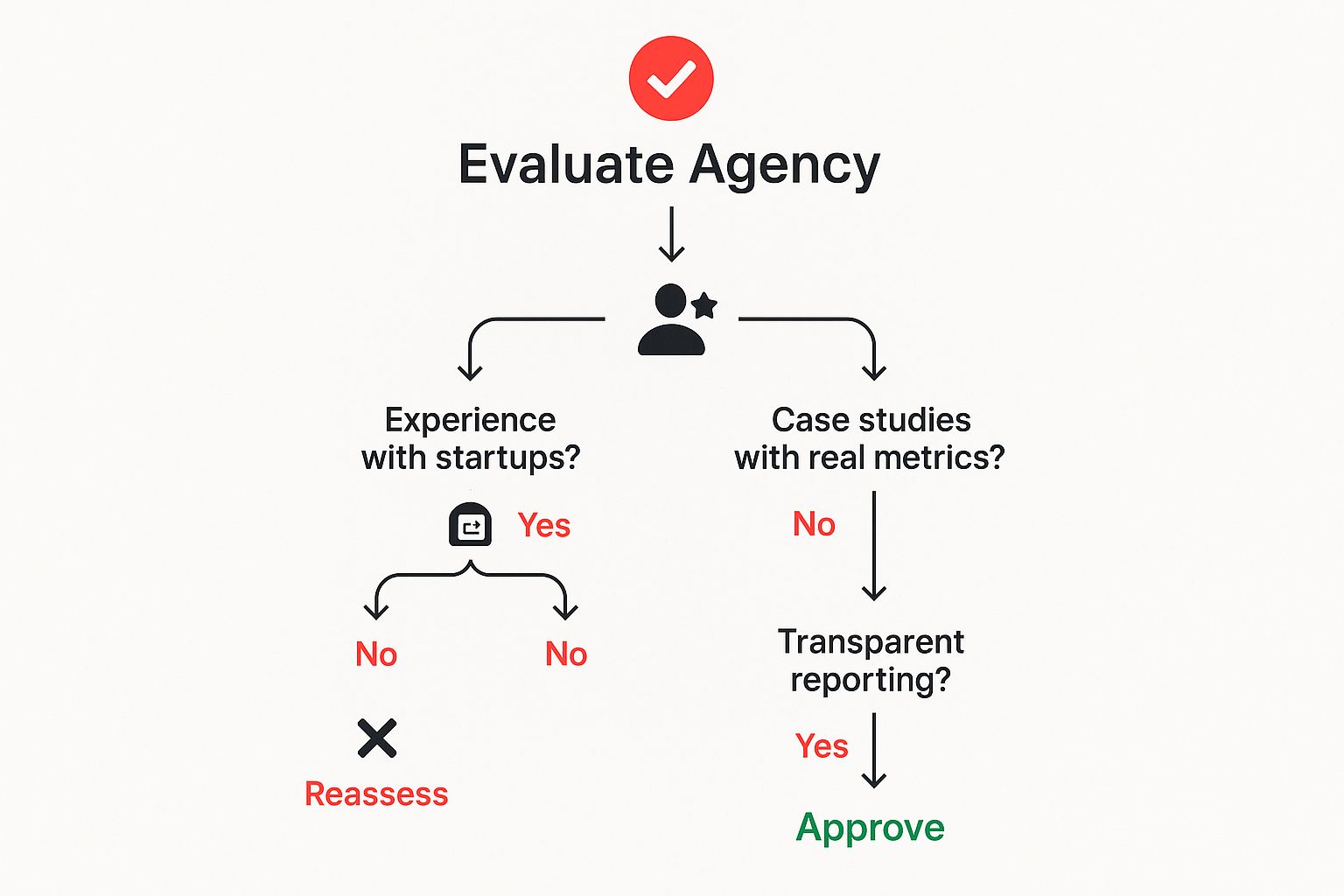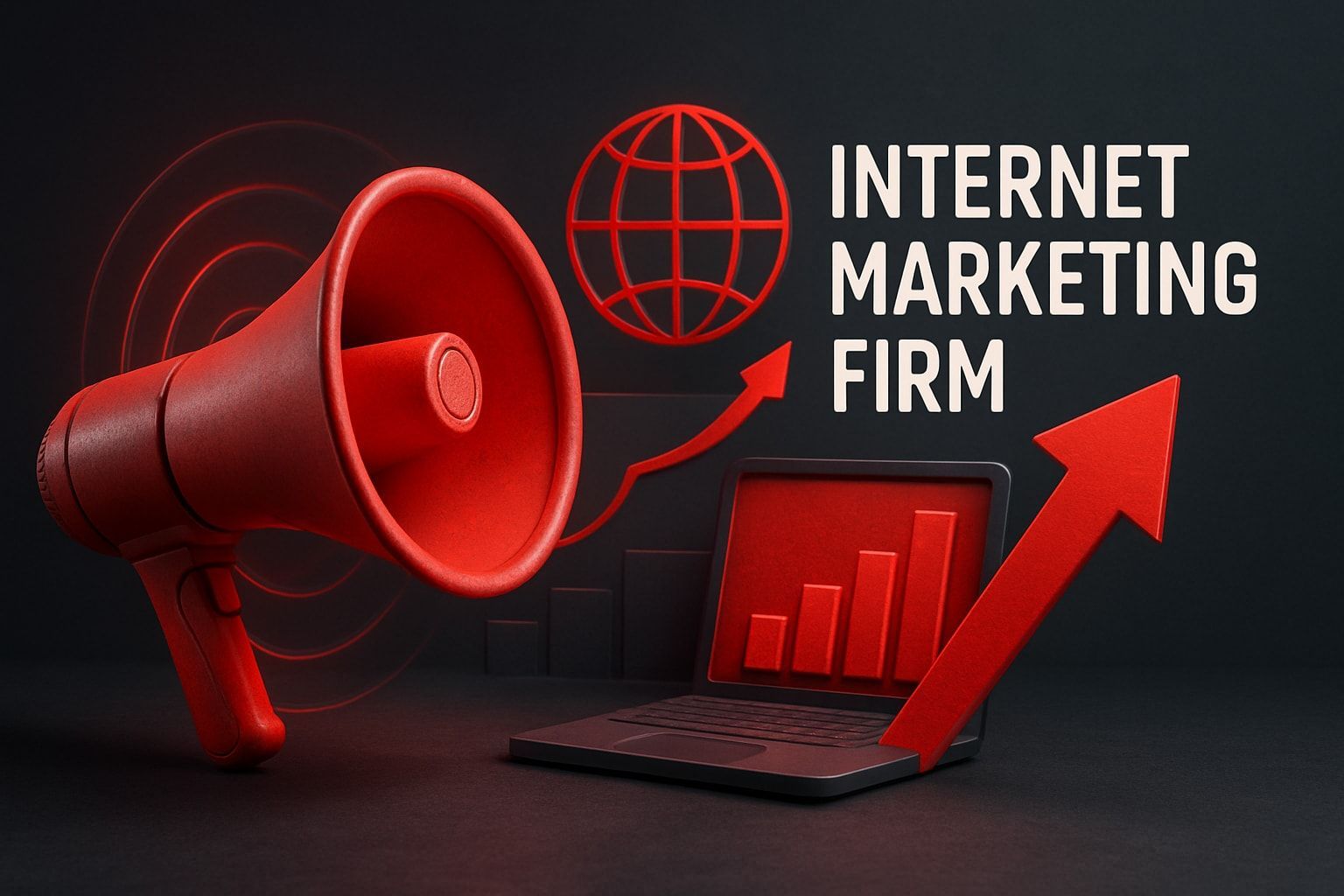Find Your Digital Marketing Agency for Startups UK Guide
For a startup, a specialist digital marketing agency is so much more than just another vendor. Think of them as a strategic partner, plugged directly into your growth engine. When you're an early-stage UK business, every pound in the budget counts and the pressure to scale is immense. This is where a specialist agency becomes your ace in the hole, bringing the expertise, speed and diverse skills you need to get real, measurable results—fast.
Why a Specialist Agency Is a Startup's Secret Weapon

The real challenge for UK startups isn't deciding if you need marketing; it's figuring out how to do it brilliantly without torching your runway. Trying to build an in-house team from scratch is a slow, expensive grind that often leaves you with a very narrow skill set.
Partnering with a specialist digital marketing agency lets you sidestep all of that. Instead of spending months trying to hire one or two good marketers, you get instant access to an entire team of pros—from SEO analysts and PPC managers to content strategists and social media gurus.
The Strategic Advantages for Startups
This immediate access to a deep well of talent is a genuine game-changer. An agency that lives and breathes the startup world knows that speed and agility are everything. They've already got proven frameworks ready to go, which can save you months of painful and costly trial and error.
A great agency relationship does more than just spend your marketing budget. It turns that budget into a powerful engine for scaling your business, driving down your customer acquisition cost (CAC) and helping you get ahead in a crowded market from day one.
Just look at the numbers: the UK's digital advertising agency market is on track to hit £20.4 billion in 2025. That’s a huge figure and it speaks volumes about the demand from businesses—especially startups—desperate to make their mark. Agencies that focus on this niche have reported incredible results for their clients, like achieving 3x faster customer acquisition and a 40% reduction in CAC compared to what others see. That's the kind of value that can make or break a new business.
Beyond Execution to True Partnership
The best agencies don't just run your campaigns and send you a report. They become a true extension of your team. They bring an objective, data-led perspective that an internal team, often too close to the product, can sometimes miss. They're not afraid to challenge your assumptions and will relentlessly focus on the metrics that actually matter for growth.
Choosing the right agency really boils down to a few key advantages:
- Cost-Effectiveness: You get a full team of experts for less than the salary of one senior in-house marketer. It’s a no-brainer.
- Speed to Market: You can get campaigns live and running in a fraction of the time, with seasoned pros who need minimal hand-holding.
- Diverse Expertise: Need a specialist for SEO, another for paid ads and a third for email? You get them all without having to hire for each role.
- Advanced Tools: You gain access to premium marketing software and analytics platforms that would be far too expensive for a single startup to afford.
Ultimately, this isn't just about offloading tasks. Outsourcing your marketing is a smart, strategic move. It frees up the founders to do what they do best—focus on the product and the core business—knowing that their growth is in expert hands.
Defining Your Mission Before the Search Begins

Before you even think about looking for a digital marketing agency for startups , the most critical work needs to happen inside your own business. It's a classic mistake to rush into agency conversations without a clear mission. It's like setting sail without a map – you’ll drift, waste a ton of time and burn through your budget.
So, let's get one thing straight. You need to move beyond vague wishes like "we need more traffic" or "we just want to grow". These goals are useless because you can't measure them and they give a potential partner nothing to work with. The first real job is to define exactly what success looks like for your startup right now.
From Vague Goals to a Solid Brief
A killer agency brief is built on SMART objectives . You’ve probably heard of them: goals that are S pecific, M easurable, A chievable, R elevant and T ime-bound. This isn't just business jargon; it's a framework that forces you to get serious about what you actually need to accomplish.
Without that clarity, you have no way of knowing if an agency's proposal is a good fit or just a load of hot air. A generic goal like "increase our online sales" gets transformed into a powerful directive when you apply the SMART framework.
A detailed brief is your most powerful filter. It instantly weeds out agencies that don't get your mission and empowers you to have sharp, focused conversations with the ones that do.
When you do this internal work first, you walk into every meeting from a position of strength, ready to articulate exactly what you need.
Real-World Scenarios for Startups
Let's make this real. Imagine you're a UK-based SaaS company. Your mission isn't just to get more sign-ups; it's to do it profitably and build a sustainable business.
- Your SMART Objective: Decrease the Cost Per Trial (CPT) from £75 to £50 within the next six months by optimising our Google Ads campaigns and improving landing page conversion rates.
Now, picture an e-commerce startup selling sustainable fashion. Your biggest headache might be getting customers to come back.
- Your SMART Objective: Increase the repeat purchase rate from 15% to 25% over the next quarter by implementing a targeted email automation sequence and a customer loyalty programme.
See the difference? These concrete goals give an agency something tangible to sink their teeth into. They can immediately start brainstorming specific strategies and channels to hit those numbers. This level of detail is absolutely fundamental and we dive deeper into this in our marketing explained guide for start-ups.
By sorting out your mission first, you turn the agency search from a guessing game into a proper strategic selection process. You’re not just hiring a supplier; you’re bringing on a partner who gets your definition of success and has a plan to help you get there. That groundwork is the true foundation of a great agency relationship.
A Startup's Vetting Checklist for Potential Agencies
Finding a digital marketing agency is easy. Finding the right one for a startup? That’s a whole different game. You’re not just looking for a service provider; you’re looking for a partner who gets the high-stakes, burn-the-boats mentality of an early-stage business.
To do that, you need to get past the slick sales pitches and figure out who really has the chops to deliver. It means asking the tough questions and not being afraid to dig deep. This isn’t just another vendor relationship – this is an extension of your core team.
Scrutinising Their Experience and Results
First things first: have they actually worked with companies like yours? I’m talking pre-seed, Seed or Series A startups. An agency that’s used to managing massive corporate budgets might not have the scrappy, agile mindset you need to survive. They need to understand the pressure to grow, fast, without a bottomless bank account.
Next, get into their case studies but don't get distracted by vanity metrics. A million impressions or a spike in website traffic looks great on a slide but it means nothing if it doesn't move the needle.
- Demand real metrics: Ask them about customer acquisition cost ( CAC ), conversion rates and return on ad spend ( ROAS ). These are the numbers that matter to a startup.
- Question the timeline: How long did it take to get those results? A six-month campaign for a household name is worlds away from a three-month sprint to find product-market fit.
- Clarify their role: What exactly did they do to make it happen? Pinpoint their specific contribution to the project's success.
This infographic lays out a simple but effective framework for that initial gut check.

Honestly, it boils down to this: if an agency can't show you real startup experience, prove their results with hard data and be transparent about it, they’re probably not the one. Move on.
Assessing Communication and Transparency
Pay close attention to how an agency communicates before you sign anything. That initial sales process is often a preview of what’s to come. Are they quick to respond? Are their answers clear and direct or are they hiding behind jargon?
You're looking for a partner who isn't afraid to have open, frequent and honest conversations.
A great agency won’t just send you a glossy report filled with confusing charts. They’ll tell you what’s working, what’s not and exactly what they’re going to do about it. That level of straight-talking transparency is absolutely essential.
While we're talking about agencies, it’s worth noting that these same principles apply if you’re thinking smaller scale. The process for hiring a social media management freelancer , for example, requires the same level of due diligence.
Finally, it’s crucial to understand that what a startup needs from an agency is fundamentally different from what an established corporation looks for. The priorities just aren't the same.
This table breaks down some of those key differences to keep in mind during your search.
Agency Vetting Checklist Startup vs Established Business Needs
| Evaluation Criteria | What Startups Should Prioritise | What Established Businesses Often Prioritise |
|---|---|---|
| Budget Approach | Flexible, performance-based models that can scale with growth. | Fixed, long-term retainers with predictable monthly costs. |
| Risk Tolerance | A willingness to experiment with new channels and pivot quickly. | Proven, low-risk strategies that protect brand reputation. |
| Speed of Execution | Rapid implementation and iteration to find what works fast. | Thorough, multi-stage approval processes and slower rollouts. |
Using this kind of focused checklist helps you cut through the noise. It lets you confidently filter out the mismatches and find a digital marketing partner that is genuinely equipped to help your startup win.
Choosing the Services That Actually Drive Growth

The moment you start talking to a digital marketing agency for startups , you’ll be hit with a dizzying menu of services. SEO, PPC, social media, content marketing... the list goes on. It's easy to get overwhelmed.
But here’s the inside track for startups: not all services are created equal, especially when you’re just getting off the ground.
Your job is to channel your limited budget into the areas that will make the biggest difference, right now. Forget the shiny objects and vanity metrics. You need activities that directly lead to customer acquisition and revenue. A good agency gets this and will steer you towards a lean, high-impact plan.
The Startup Marketing Trinity: SEO, PPC and Content
For most new businesses, a strong marketing foundation rests on three pillars: Search Engine Optimisation (SEO) , Pay-Per-Click (PPC) advertising and Content Marketing . When used together, they create a seriously powerful engine for growth.
Think of SEO as your long-term investment. It's all about making your website more visible in search results to attract a steady stream of "free" organic traffic. It’s not a quick fix but it's the bedrock of sustainable, long-term growth.
PPC , on the other hand, is your short-term accelerator. Using platforms like Google Ads , you can put your brand right in front of people the very moment they’re looking for a solution like yours. It’s perfect for getting immediate leads and testing what messaging works.
Content marketing is the glue that binds everything together. Great content builds trust with your audience, establishes you as an authority and provides the fuel for both your SEO and PPC campaigns to really take off.
Why Local SEO is a Game-Changer for UK Startups
If your startup serves a specific town, city or region, a focused local SEO strategy can give you a massive edge. A huge percentage of Google searches have local intent, so showing up in local results and on Google Maps can drive highly-qualified foot traffic and phone calls straight to your door.
Just think: a new coffee shop in Manchester or a plumbing service in Bristol isn’t trying to compete with national chains. Their battle is for local dominance and an agency that knows local SEO can help them win it.
For a startup, the right service mix isn't about doing everything. It's about doing the right things exceptionally well. Focus on channels that deliver measurable results and align directly with your immediate growth goals.
The digital marketing spend in the UK is enormous for a reason. It hit £35.54 billion in 2024 and is on track to pass £40 billion in 2025. This shows just how vital these channels are, with 77% of UK businesses investing in SEO and 65% using paid search. You can see more data on how startups are using digital marketing over on marketerhire.com.
Matching the Services to Your Business Model
The right marketing mix is completely dependent on what you sell. Here’s a quick breakdown of how to think about it:
- For SaaS Startups: Go heavy on content marketing to educate potential users and use targeted PPC to capture people actively searching for your type of software.
- For E-commerce Brands: The winning formula is often a blend of SEO for organic product discovery, Google Shopping ads to show up for specific product searches and slick social media advertising .
- For Service-Based Businesses: Local SEO is an absolute must, supported by tactical PPC campaigns designed to generate immediate leads and enquiries.
At the end of the day, your website is the hub for all this activity. Making sure it’s built for growth from day one is non-negotiable, which is why understanding the essentials of website development for startups is a great next step. By choosing your services wisely, you ensure every pound spent with an agency is a pound spent moving your business forward.
Right, so you’ve signed on the dotted line. The agency search is over. But popping the champagne cork now would be a mistake.
Signing the contract isn’t the finish line; it’s the starting gun. The real work begins now.
Whether your new partnership with a digital marketing agency for startups flourishes or flounders all comes down to what happens next. A killer onboarding process is the foundation for a brilliant long-term collaboration.
Think of your new agency as an extension of your own team, not just an outside vendor. To really get things moving, they need to be plugged into your workflow, armed with all the context and tools to hit the ground running. This is about more than just handing over a few logins; it’s about creating genuine alignment from day one.
Your first big move? A comprehensive kick-off meeting. This one session sets the tone for the entire relationship, so don't rush it.
- Introduce the Key Players: Make sure the agency team meets everyone they’ll be working with, not just your main point of contact. Put faces to names early on.
- Hammer Home the Goals: Walk them through your business objectives, your ideal customer personas and the KPIs you’ve agreed on. This isn't a repeat—it's about reinforcing the mission.
- Tell Your Brand Story: Go beyond the product specs. Share your origin story, what your company truly stands for and the big vision. Help them understand your ‘why’.
Getting Access and Finding Your Rhythm
To do their job, an agency needs seamless access to your core marketing and analytics platforms. Any delays here will kill momentum before it even starts.
Be ready on day one to grant access to the essentials: your website’s CMS, Google Analytics, social media accounts and any ad platforms you’re already using.
Just as important are your communication channels. You need to figure out how and when you’ll talk to each other, right from the get-go.
The goal is to create a collaborative space where information flows freely. Decide on a primary tool—like a shared Slack channel or a standing weekly video call—and stick to it. This avoids messy email chains and missed updates.
A clear structure stops things from getting lost in translation. Regular, scheduled catch-ups build transparency and trust, turning a simple client-vendor setup into a genuine strategic partnership. It's this rhythm that makes an agency feel properly embedded in your startup’s journey.
What to Realistically Expect in the First 90 Days
Finally, let's talk about expectations. Immediate, dramatic results are incredibly rare, especially for long-game strategies like SEO and content marketing.
The first 30 to 60 days are all about learning, auditing and tweaking. Your agency will be testing ideas, digging into the data and laying the groundwork for sustainable growth.
A great partnership is built on patience and a shared understanding that these first few months are about building the launchpad, not reaching the moon. Trust the process, keep the lines of communication wide open and celebrate the small wins. They’re the signals that you’re on the right track for the long haul.
Got Questions About Hiring an Agency?
Finding the right digital marketing partner can feel like navigating a minefield, especially when you're a startup founder juggling a million other things. You've got pressing questions and you need straight answers. Let's get into some of the most common queries we hear from UK founders at this critical stage.
Getting this clarity helps you move forward with confidence, making sure you find a partner who actually gets your vision and can help you bring it to life.
How Much Should a Startup Pay for a Digital Marketing Agency in the UK?
This is always the big one, isn't it? The honest answer is: it varies. A lot. The cost really depends on the scope of work and the agency's depth of experience.
Generally, UK startups can expect to see monthly retainers starting around £1,500 for basic services, climbing to £10,000+ for a full-blown, multi-channel strategy.
The real key, though, is to stop focusing on the price tag and start thinking about the return on investment. A good agency will be totally upfront about their pricing, tying their fees directly to specific deliverables and performance goals. Always push for a detailed proposal that breaks down exactly what you're paying for. If you're trying to get a handle on the budget, a practical guide to understanding digital marketing agency costs can really help demystify the different pricing models out there.
Should We Choose a Niche Agency or a Generalist One?
For most startups, going with a niche agency is the smarter move. Think about it: an agency that lives and breathes your industry—whether it's FinTech, SaaS or e-commerce—already speaks your language. They know your audience, your market's quirks and the challenges you’re up against. This means they can get effective strategies up and running much, much faster.
A generalist agency might have a broader portfolio but they'll need time to get up to speed on your market's nuances. When your runway is finite, that's a learning curve you can't afford. A specialist partner can deliver targeted results more quickly and for a startup, speed is everything.
Choosing a niche agency is like hiring a specialist surgeon for a complex operation instead of a GP. They've seen your exact problem countless times and know the most effective way to fix it, saving you precious time and money.
What Are the Biggest Red Flags to Watch Out For?
You need to keep your wits about you. Be very wary of any agency that makes wild, over-the-top promises. If you hear someone guaranteeing a "#1 spot on Google in a month," it’s a massive red flag. Digital marketing results are influenced by too many factors to ever be guaranteed.
Here are a few other warning signs to look for:
- A lack of transparency: They're cagey about their process or can't clearly explain how they measure success.
- Irrelevant case studies: They can't show you any examples of their work with companies similar to yours in size or industry.
- High-pressure sales tactics: A genuinely good partner wants to build a long-term relationship, not just rush you into signing a contract.
How Long Should We Give an Agency to See Results?
This all comes down to the channels you're using. With something like Pay-Per-Click (PPC) advertising, you should start seeing traffic and pulling in initial data within the first few weeks. It’s pretty immediate.
But for the long game—strategies like SEO and content marketing—it’s a marathon, not a sprint. It can easily take 3-6 months before you see a really significant, measurable impact on your organic traffic and lead generation.
A great agency will set crystal-clear expectations from day one. They'll give you a realistic roadmap with milestones for short-term wins and clear long-term goals.
Ready to partner with a digital marketing agency that understands the unique needs of UK startups? The team at Superhub specialises in creating data-driven strategies that deliver real, measurable growth. Visit us to find out how we can help you scale.
Want This Done For You?
SuperHub helps UK brands with video, content, SEO and social media that actually drives revenue. No vanity metrics. No bullshit.



